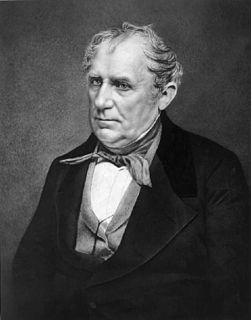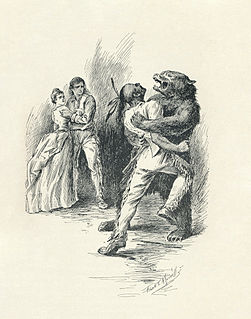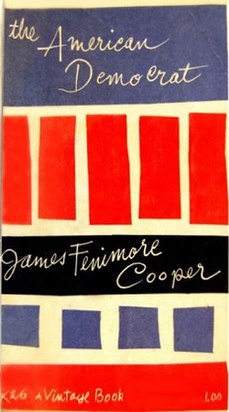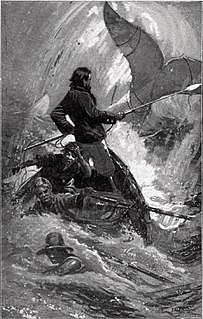Related Research Articles
Republicanism is a representative form of government organization. It is a political ideology centered on citizenship in a state organized as a republic. Historically, it ranges from the rule of a representative minority or oligarchy to popular sovereignty. It has had different definitions and interpretations which vary significantly based on historical context and methodological approach.

Wallace Stevens was an American modernist poet. He was born in Reading, Pennsylvania, educated at Harvard and then New York Law School, and he spent most of his life working as an executive for an insurance company in Hartford, Connecticut. He won the Pulitzer Prize for Poetry for his Collected Poems in 1955.

James Fenimore Cooper was an American writer of the first half of the 19th century. His historical romances draw a picture of frontier and Native American life in the early American days which created a unique form of American literature. He lived most of his life in Cooperstown, New York, which was founded by his father William on property that he owned. Cooper was a lifelong member of the Episcopal Church and contributed generously to it. He attended Yale University for three years, where he was a member of the Linonian Society.

Susan Augusta Fenimore Cooper was an American writer and amateur naturalist. She founded an orphanage in Cooperstown, New York and made it a successful charity. The daughter of writer James Fenimore Cooper, she served as his secretary and amanuensis late in his life.

The Last of the Mohicans: A Narrative of 1757 is a historical novel written by James Fenimore Cooper in 1826.

The public sphere is an area in social life where individuals can come together to freely discuss and identify societal problems, and through that discussion influence political action. Such a discussion is called public debate and is defined as the expression of views on matters that are of concern to the public—often, but not always, with opposing or diverging views being expressed by participants in the discussion. Public debate takes place mostly through the mass media, but also at meetings or through social media, academic publications and government policy documents. The term was originally coined by German philosopher Jürgen Habermas who defined "the public sphere as a virtual or imaginary community which does not necessarily exist in any identifiable space". Communication scholar Gerard A. Hauser defines it as "a discursive space in which individuals and groups associate to discuss matters of mutual interest and, where possible, to reach a common judgment about them". The public sphere can be seen as "a theater in modern societies in which political participation is enacted through the medium of talk" and "a realm of social life in which public opinion can be formed".

The Leatherstocking Tales is a series of five novels by American writer James Fenimore Cooper, set in the eighteenth century era of development in the primarily former Iroquois areas in central New York. Each novel features Natty Bumppo, a frontiersman known to European-American settlers as "Leatherstocking", "The Pathfinder", and "the trapper". Native Americans call him "Deerslayer", "La Longue Carabine", and "Hawkeye".
Thomas Raynesford Lounsbury was an American literary historian and critic, born in Ovid, New York, January 1, 1838. He graduated from Yale College in 1859 and subsequently received honorary degrees from Yale, Harvard, Lafayette, Princeton, and Aberdeen. He enlisted in the 126th New York Volunteers in 1862 and served in the Civil War as a first lieutenant.

The Deerslayer, or The First War-Path (1841) was the last of James Fenimore Cooper's Leatherstocking Tales to be written. Its 1740-1745 time period makes it the first installment chronologically and in the lifetime of the hero of the Leatherstocking tales, Natty Bumppo. The novel's setting on Otsego Lake in central, upstate New York, is the same as that of The Pioneers, the first of the Leatherstocking Tales to be published (1823). The Deerslayer is considered to be the prequel to the rest of the series. Fenimore Cooper begins his work by relating the astonishing advance of civilization in New York State, which is the setting of four of his five Leatherstocking Tales.
The Society of American Historians Prize for Historical Fiction, formerly known as the James Fenimore Cooper Prize, is a biennial award given for the best Historical American fiction by the Society of American Historians. It is awarded in the odd-numbered years.
Precaution (1820) is the first novel written by American author James Fenimore Cooper. It was written in imitation of contemporary English domestic novels like those of Jane Austen and Amelia Opie, and it did not meet with contemporary success. Cooper went on to have great success with works such as The Pathfinder (1841) and The Deerslayer (1840). The American reading public responded most to The Last of the Mohicans (1826).

The American Democrat: Or, Hints on the Social and Civic Relations of the United States of America, a political essay written by American republican author James Fenimore Cooper, was published initially in New York State in 1838. Originally intended as a textbook on the American republican democracy, the work analyzes the social forces that shape, and can ultimately corrupt such a system.

Dana D. Nelson is a professor of English at Vanderbilt University and a prominent progressive advocate for citizenship and democracy. She is notable for her criticism—in her books such as Bad for Democracy—of excessive presidential power and for exposing a tendency by Americans towards presidentialism, which she defines as the people's neglect of basic citizenship duties while hoping the president will solve most problems. Her scholarship focuses on early American literature relating to citizenship and democratic government.

The Bravo is a novel by James Fenimore Cooper first published in 1831 in three volumes. Inspired by a trip to Europe where he traveled through much of Italy, the novel is set in Venice. The Bravo is the first of Cooper's three novels to be set in Europe. This group of three novels, which one critic would call Cooper's "European trilogy", include The Heidenmauer and The Headsman. Like his other novels set in Europe, The Bravo was not very well received in the United States. The book largely focuses on political themes, especially the tension between the social elite and other classes.

The Heidenmauer; or, The Benedictines – A Story of the Rhine is a novel by James Fenimore Cooper, first published in 1832. The novel is a socio-political novel set in 16th-century Germany that focuses on the competition between various socio-political classes and the tension caused by the Reformation. The Heidenmauer is Cooper's second novel in what one critic would call his European Trilogy, following The Bravo and preceding The Headsman. Like the other novels set in Europe, The Heidenmauer is intent on showing the darker side of European institutions in favor of an American perspective.

"Fenimore Cooper's Literary Offenses" is an 1895 essay by Mark Twain, written as a satire and criticism of the writings of James Fenimore Cooper. Drawing on examples from The Deerslayer and The Pathfinder from Cooper's Leatherstocking Tales, the essay claims Cooper is guilty of verbose writing, poor plotting, glaring inconsistencies, overused clichés, cardboard characterizations, and a host of similar "offenses".

Nautical fiction, frequently also naval fiction, sea fiction, naval adventure fiction or maritime fiction, is a genre of literature with a setting on or near the sea, that focuses on the human relationship to the sea and sea voyages and highlights nautical culture in these environments. The settings of nautical fiction vary greatly, including merchant ships, liners, naval ships, fishing vessels, life boats, etc., along with sea ports and fishing villages. When describing nautical fiction, scholars most frequently refer to novels, novellas, and short stories, sometimes under the name of sea novels or sea stories. These works are sometimes adapted for the theatre, film and television.
The Two Admirals is an 1842 nautical fiction novel by James Fenimore Cooper. The novel was written after the Leatherstocking Tales novel The Deerslayer. Set during the 18th century and exploring the British Royal Navy, Cooper wrote the novel out of encouragement of his English publisher, who recommended writing another sea novel. Cooper had originally intended to write a novel where ships were the main characters, though eventually decided not to. The novels is one of three novels which Cooper would revise for editions following their first printing, the other two being The Pathfinder and Deerslayer.
Wyandotté is a historical novel published by James Fenimore Cooper in 1843. The novel is set in New York state during the American Revolution. The main character of the novel is an Indian, "Saucy Nick", also called Wyandotté, whose depictions violate stereotypes of Native Americans.
The Headsman: The Abbaye des Vignerons is an 1833 novel by James Fenimore Cooper set in Switzerland. The novel was inspired by one of Cooper's trips during his European travels in 1832. The novel is one of three of Cooper's "European" novels, following The Bravo and The Heidenmauer, all of which use the European setting to deal with socio-political contrast with American institutions.
References
- 1 2 Sinche, Bryan (2012). ""Those Sounds That Had Obtained a Command": Voice, Power, and Submission in Cooper's Sea Fiction". Early American Studies: An Interdisciplinary Journal. 10 (1): 132–161. doi:10.1353/eam.2012.0000. ISSN 1559-0895.
- 1 2 Frisch, Morton J. (1961-01-01). "Cooper's Notions of the Americans: A Commentary on Democracy". Ethics. 71 (2): 114–120. ISSN 0014-1704. JSTOR 2379512.
- ↑ Wallace, James D. (July 1986). George A. Test, (ed.). ""The Paradise of Women": The Domestic Sphere in Notions of the Americans". James Fenimore Cooper: His Country and His Art, Papers from the 1986 Conference. State University of New York College at Oneonta: 78–93 – via James Fenimore Cooper Society.CS1 maint: extra punctuation (link)